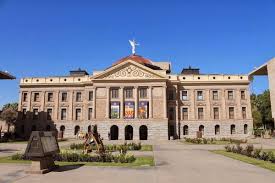
Arizona Public Health at Risk: Join AZPHA in Defending Health and Healthcare
AZPHA stands with health professionals across the country in sounding the alarm about the damaging impact current and proposed federal policies are having on public health and healthcare infrastructure. We’re calling on our members—and all health professionals and organizations in Arizona—to sign this national open letter opposing these destructive changes and protecting the future of public health. This isn’t politics—it’s about protecting lives and the systems we all rely on for clean

Standing Up for Public Health: How We’re Helping APHA Fight Back
AZPHA recognizes the challenges we face as Trump, Kennedy and Musk continue to make decisions that are devastating our public health system…. actions that are damaging public health systems, outcomes, prevention efforts, health equity, and critical research resources. While we know we have no ability to influence Trump or Kennedy – we can support those challenging these damaging policies using the judicial branch. APHA has taken a proactive stance by

Delayed Cuts, Immediate Costs: Budget Bill Front-Loads Tax Breaks, Defers Social Program Reductions
The US House of Representatives passed a large budget reconciliation bill last week with large tax cuts for the wealthy and anticipated spending cuts in areas like Medicaid, premium subsidies on the healthcare insurance marketplace, SNAP and WIC. I’ve been on vacation and haven’t had much time to delve into the details of the bill (which still needs to get through the Senate), but here are the basics: Medicaid Reductions Introduction

Legislative Update: Memorial Day 2025
The AZ State Legislature remains on break for another week as they prepare to come back in June and hammer out the state budget. The majority of public health related bills have been thru the system and either passed and were signed or died a quiet death by not even having a hearing. There are a few bills still in limbo – bulls that have made it most of the

Happy Birthday Social Security – Guest Blog from Leonard Kirschner MD, MPH
Americans love anniversaries whether it is the birth of our nation on July 4th, our parents 50th, Pearl Harbor or 9/11. The year 2025 has a number of significant anniversaries of laws that have changed American society in uncountable ways. On August 14, 1935, in the height of the Great Depression, President Franklin Delano Roosevelt signed Social Security into law. Opponents fought long and hard to stop passage calling it

US House Agriculture Committee Advances Proposal Requiring States to Pay for Part of SNAP – Measure could end SNAP benefits if Legislature doesn’t pay up
This week, the House Agriculture Committee advanced a big (bad) change to the Supplemental Nutrition Assistance Program by approving a provision that would require states to contribute to the cost of SNAP benefits — a departure from the program’s longstanding federal funding model. For the last few decades, the federal government has covered 100% of SNAP benefits – with administrative costs shared between federal and state governments. Under the new